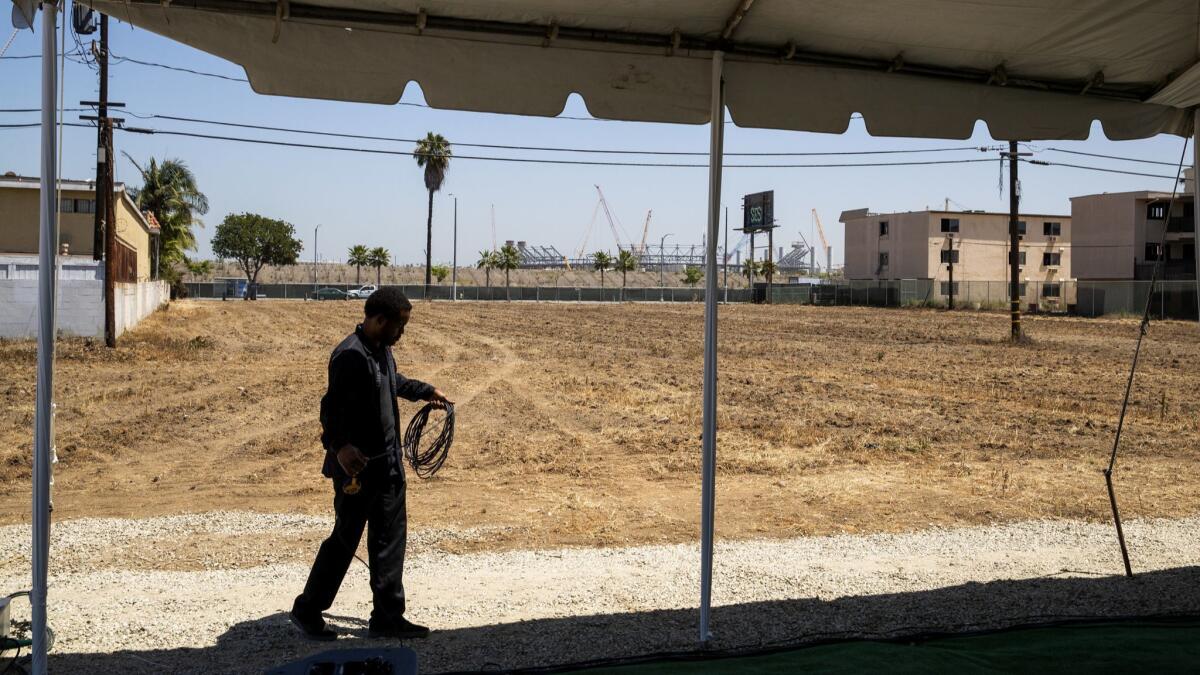Capitol Journal: If Steve Ballmer can get regulatory relief to build a new Clippers arena, why not the little guys?

Reporting from Sacramento — The Clippers are asking the Legislature for special treatment on environmental regulations so they can build a new basketball arena faster. They’ll get it.
And they probably should. Why not? Special regulatory deals for major league sports teams are being handed out in Sacramento like free bobbleheads.
The Oakland A’s also are seeking legislation to expedite building a new baseball stadium. They’ll score, too.
In recent years, the Legislature and Gov. Jerry Brown have smoothed the regulatory process for the Sacramento Kings and Golden State Warriors to construct fancy basketball arenas. Lawmakers also have tried to help erect other stadiums that didn’t get built for various reasons.
All that’s fine. But what about less glamorous, more modest housing developments? Or retail stores? Industrial parks? They’re still stuck with the pokey California Environmental Quality Act, or CEQA, which project opponents too often abuse to wrest financial concessions from developers, or to kill potential competition.
“The irony is that millionaire athletes and billionaire team owners are getting [CEQA] exemptions, but middle-class home builders are not,” complains Dan Dunmoyer, president and chief executive of the California Building Industry Assn.
“CEQA no longer is what it was intended to be. It has become a racket. There’s no way California is going to meet its housing needs for the foreseeable future without CEQA reform.”
Signed 48 years ago by Gov. Ronald Reagan, CEQA requires builders and other entrepreneurs to undergo a long, costly process of detailing their projects’ environmental effects.
The act deserves credit for helping to clean up the air, keep water pure and prevent greedy developers from building on fragile earthquake faults.
But CEQA has also been blatantly abused, for example by union blackmailers —“greenmailers ” — who threaten to file environmental suits and derail projects unless developers cave to labor demands.
Business rivals also try to drive off potential competitors by filing time-consuming environmental lawsuits. The investor finally is forced to cut losses and drop the project.
“CEQA originally was a good law,” Assembly Republican Leader Brian Dahle of Lassen County says. “But it turned into something used for extortion and to keep other businesses out.”
On higher ground ethically are the NIMBYs — “not in my backyard” — who fight local projects because they would crowd their spaces or block their views. Yet, California faces an affordable housing crisis, and new dwellings must be built somewhere.
“CEQA suits are overwhelmingly filed against environmentally benign projects by people using them for non-environmental reasons,” land use attorney Jennifer Hernandez of Berkeley once told me. She’s a lawyer who usually represents project sponsors. But she’d also just studied 600 CEQA lawsuits and published a report that validated her statement.
Back to sports teams and the Clippers.
Since CEQA suits can last years, what’s mostly sought is fast-tracking through the litigation swamp. The main benefit bestowed by the Legislature has been a nine-month limit on court proceedings concerning environmental challenges.
Under the nine-month limit, environmental regulations remain essentially the same, but the review process is greatly expedited. Also, judges can’t stop construction unless there’s an imminent safety risk.
Clippers owner Steve Ballmer — the former Microsoft CEO who’s worth an estimated $38 billion — wants to move his team out of the downtown Los Angeles Staples Center and into a new, state-of-the-art arena in Inglewood. The new digs will cost about $1.2 billion, he told me.
But the Clippers’ lease at Staples expires after the 2024 season. So either he builds relatively quickly or he doesn’t build at all, Ballmer said. And he badly wants to build.
Staples, he said, is outdated. It accommodates hockey — the Kings — and isn’t cozy enough for basketball. Also, the Clippers are third in line for game dates behind the Kings and the Lakers. The Clippers are forced to play too many Saturday afternoon games, he said, “when everyone else is out in the sun.”
Coverage of California politics »
Plus, he added, Inglewood “badly needs jobs. We’ll be an investment in the community, on land where you can’t build homes.” The arena site is under the L.A. International Airport flight path.
Won’t the jet noise be aggravating during games — an environmental problem? No, he answered. “We’re going to build an arena that’s great for concerts.”
The Clippers’ bill, AB 987, sailed out of the Senate Environmental Quality Committee last week on a unanimous bipartisan vote. So did the bill to help the A’s.
When the bills reach Brown’s desk, he probably won’t hesitate to sign them. He has advocated CEQA reform for years without doing much.
“I don’t know,” says the bill’s author, new Assemblywoman Sydney Kamlager-Dove (D-Los Angeles), who represents Inglewood. “He’s a mercurial governor. So I don’t count my chickens before they hatch.”
The Sierra Club opposes the legislation. “We’re against the weakening of CEQA, generally,” says Sierra Club lobbyist Kyle Jones.
The state Judicial Council opposes it, too. It “pushes other cases on the courts’ dockets to the back of the line,” the council declares. “Such preferential treatment is fundamentally at odds with how our justice system has historically functioned.”
Sacramento should greatly increase court funding so all civil cases can be heard much faster.
And it should reform CEQA. But Democrats won’t cross environmentalists or — especially — labor unions.
The Legislature is moving a bill to fast-track CEQA during rebuilding for victims of last year’s wine country wildfires. That’s good.
And it just passed a bill to fast-track construction of a new legislative office building. That’s self-serving.
What’s good for billionaires and legislators should be good for everyone.
Follow @LATimesSkelton on Twitter
More to Read
Get the L.A. Times Politics newsletter
Deeply reported insights into legislation, politics and policy from Sacramento, Washington and beyond. In your inbox three times per week.
You may occasionally receive promotional content from the Los Angeles Times.











